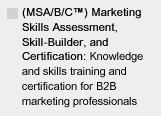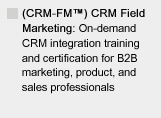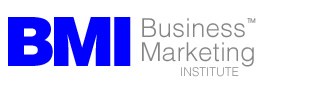MAKE SURE YOU CONTINUE TO RECEIVE EACH ISSUE OF TUESDAY MARKETING NOTES—CLICK HERE TO RENEW YOUR FREE SUBSCRIPTION (IF YOU'VE ALREADY SUBSCRIBED, NO NEED TO RE-SUBSCRIBE)

Success with Google AdWords: Developing Killer Content for Effective B2B Lead Generation Programs (Part 2)
by Eric Gagnon
In last week’s TMN on Google AdWords, we addressed the critical importance of content in Google AdWords keyword search text ad programs, and how the process of executing AdWords programs for B2B lead generation efforts actually starts with developing great content, before writing text ads or developing the other parts of your program.
As we’ve already described, the process of developing killer content for your Google AdWords programs begins with identifying problems encountered by your prospects, and the next step is uncovering what your company knows that helps prospects solve the problem addressed by your product.
2.) "Show What You Know:" Assessing and Presenting What Your Company Knows that Solves Your Potential Prospect’s Problem
Describing to prospects how products such as yours, backed by your company’s special and unique knowledge or expertise, help them solve their problem, is an excellent basis for developing the content of the information deliverable to use for your keyword search marketing programs. You are probably well aware of the major problems and issues facing potential prospects in your market; they’re the same problems that motivated your company’s previous prospects to become your current customers. If you haven’t thought of your product’s benefits in terms of the problems or business issues your product helps to solve, you can define these problems by talking with your company’s sales reps, your current customers, and your existing prospects.
Every company, including your company (or client), has gained special knowledge, expertise, experience, or some other uniquely positive attribute it applies to the manufacture of its product, or unique skills and know-how it applies to its service. Once you have identified the major problems faced by your market that are solved or addressed by your product, think of how you will assess, develop, and present this knowledge-based content to show how your company will apply this unique knowledge and expertise to solving the potential prospect’s problem.
Checklists for Defining Prospect Problems for AdWords Content Deliverables
Here are some general idea-starters for helping you outline problems shared by the potential prospects your market, and the knowledge or other special attributes your company holds that solves problems in its market. These will help you get started in the process of writing your content deliverable (or for writing copy notes to pass along to someone else who’s writing it):
Defining and describing the problem:
• What is the problem experienced by target prospects in your market?
• Who experiences this problem in your market? How is this problem perceived by the various people who are affected by the problem in your prospect’s company?
• What are the signs, symptoms, or early warning signs of this problem—i.e., when does someone know they have this problem?
• What is the negative impact of this problem? (if possible, this should be measurable in cost, lost efficiency, or other figures cited from a respected industry group);
• What is the worst-case outcome of this problem?
Assessing, developing, and articulating your company’s expertise in solving the problem:
• What special expertise, knowledge, process, features, or other unique attribute does your company possess that helps prospects solve this problem?
• How and why do these special attributes provide the best solution to this problem?
• How and why are these special attributes unique to your company, and how and why are they not available from any of your competitors?
• Was your company the pioneer or innovator in developing these attributes?
Solving the prospect’s problem:
• When applied to your product, how does your company’s unique knowledge, or other attribute, solve the prospect’s problem?
• How is your unique attribute, embodied by your product or solution, better at solving this problem than other products or approaches?
• How will the prospect benefit in a concrete way from your product’s solution to their problem, backed by your special knowledge or other unique attribute—i.e., will they save money? Make money? Be more efficient or productive?
• Can these concrete benefits be measured, or can you prove them by citing results gained from your currrent customers’ use of your product?
• How else does your company’s unique knowledge or other attribute make your product better than your competitors’ products?
Once you have articulated the problem, and your company’s expertise (or other attributes) that help the prospect solve their problem, it then becomes much easier to develop the content of the information deliverable. Once you complete the information deliverable, it then becomes easier still to develop keywords and text ads for your keyword search marketing program.
3.) Developing Content that Motivates Google Searchers to Become Prospects
As you write the content that becomes the information deliverable to draw signups from new prospects for your keyword search marketing programs, think about the form this deliverable should take. Here are some examples of the various forms of information deliverables used in keyword search marketing programs:
• White papers are very commonly-used information premiums in keyword search marketing programs, and cover virtually any topic. Traditional white papers range from highly technical or specialized documents which cover an issue or business problem in a detached, non-promotional style intended to inform and educate the reader, to marketing-oriented pieces that advocate strongly for a product, but without using the typical promotional tone and content found in company brochures ("marketingspeak");
• eBooks, another popular format, are publications of around 50 pages or less,
structured and written like booklets, and designed to be read on a computer screen. Because they resemble books, eBooks tend to have a higher perceived value than white papers, studies, or other information deliverables;
• Research reports, studies, or industry analyses are usually authored by third party industry research or consulting firms, and, because of this, are perceived as being more credible than information deliverables authored and published by companies. Research, studies, or other industry analysis that supports or advocates for the solution or approach followed by your company and its product can often be used as an information premium in your keyword marketing programs, and these premiums are especially attractive if they would otherwise be costly for a prospect to purchase on their own;
• Applications briefs or case studies let you focus your product’s solution on how actual customers use your product in their specific application, or in case studies describing how your product solved a problem for a specific company.
The most common form of information premium used in B2B keyword search marketing programs is the white paper, but you can use any of these forms to suit your content. Your information deliverable can take virtually any form as long as it’s viewed by you potential prospects as being different, more factual, and more informative than a common marketing piece (such as a brochure or sales flyer), and if you are providing information having some perceived value that helps your reader solve their specific problem or business issue.
Once you have an information deliverable in hand, you can also use it as a premium for ads linked to keywords that aren’t related to problems solved by your product, such as for keywords on product names, product types, and other keywords directly related to your product or product category.
Tangible and non-informational deliverables: Premiums may also take the tangible form of books, booklets, DVDs (for specialized technical videos), or slide guides (cardboard calculators for specialized industry or technical functions). Of course, premiums offered in tangible form cost more than Web pages or electronic .PDF files, but they do offer a higher perceived value compared to these “virtual” premiums. Plus, the added benefit of offering tangible deliverables is you can gather prospect mailing addresses for addition to your opt-in mailing list, to send future hard-copy mailings to these prospects in your lead development process.
Depending on the type of product you sell, you can also offer premiums that aren’t information-based, such as free trials, free samples, free evaluations, or other trial offers to motivate prospects to sign up from your keyword search advertising. To reduce the cost of these premiums being sent to unqualified recipients, you can ask prospects for more extensive qualifying information (such as their buying intention, company size, or specific product interests) when they sign up for the item.
If You Don’t Know What Content is Best—Test!
How to decide what white paper topic in which form is right for your content and your marketing program: Your choice of which topic, information deliverable, or premium to use will be a decision that’s unique to your company, based on the products you sell, your market, and your expertise in this market. If you are ever uncertain on which form of information deliverable, topic addressed, or special offer to use, the best solution is to test each type in AdWords; for example, by testing ads for different white papers on two or more topics, against an ad for a savings offer, and tracking response to all three campaigns.
4.) Finding the Keywords Your Potential Prospects Use to Search for Products Like Yours, or Problems Solved by Your Product
Once you’ve developed the information deliverable(s) to be provided to prospects who sign up to receive them, you are now ready to move on the next step in developing your AdWords marketing program: Developing the lists of keywords and keyword phrases to draw searchers to your text ads on Google.
The process of developing keywords is active, ongoing, and dynamic throughout the execution of your search marketing program: Once you have all of your elements in place (information deliverable, keywords, and text ads), you’ll launch your program, and then the truly interactive nature of search marketing begins.
You’ll be making constant, ongoing adjustments to your keyword lists based on the impressions, click-throughs and cost of these keywords, as searchers using these keywords click through on your text ads, provide their information on your landing pages, and download your information deliverables. By going through this process of adding, eliminating, and modifying keywords (as well as changing text ads and other aspects of your program), over time you’ll refine your keyword marketing program, increasing your click-throughs and conversions, and lowering your overall cost of lead generation. As you constantly change and tweak your program, and observe the response to your changes, you’ll also gain a more intuitive feel for how much interest there is among searchers for your product, and the best ways to present your product to receive solid response on your search programs.
Next week, we’ll drill deep into the art and craft of developing effective keyword lists for your Google AdWords text advertising programs . . .
Eric Gagnon (eric@realmarkets.net), a director with the Business Marketing Institute, is author of The Marketing Manager’s Handbook and The CRM Field Marketing Handbook, and president of GAA ( http://www.realmarkets.net ), an interactive marketing, turnaround, and product development consulting firm.








